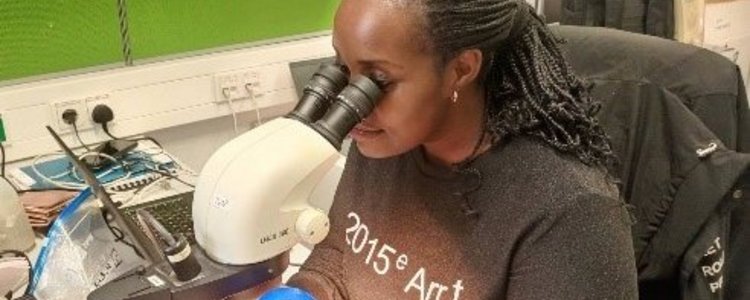Priscilla Wangari Muriithi is a doctoral student in Limnology at Egerton University, Kenya. In March and April 2023, she took part in a traineeship at the University of Natural Resources and Life Sciences, Vienna (BOKU) through the Erasmus+ International Credit Mobility programme.
OeAD: What motivated you to participate in an Erasmus+ mobility?
Wangari Muriithi: Erasmus+ gave me a chance to be trained and mentored abroad, since expertise in my field of study is lacking in my home country and university. BOKU has one of the best equipped laboratories and expert groups in Stream Benthic Invertebrate Ecology and Taxonomy led by Prof. Wolfram Graf. I have been aspiring to be trained as a Macroinvertebrate Taxonomist for a long time and my dream came true when I received the Erasmus+ International Mobility fellowship through the motivation and assistance from Prof.Nzula Kitaka and Mag. Gerold Winkler who secured the mobility for me.
OeAD: What were your expectations and fears going into the mobility, and in what way did they come true or not?
Wangari Muriithi: One of my expectations was to become a highly skilled taxonomist who would identify the macroinvertebrates into species level. Within my two months of stay at BOKU, I was able to gain 70% of the skills, which I really appreciate and wish to get another opportunity to perfect. I also expected to complete writing my PhD proposal under the guidance of Prof. Wolfram, and I managed to do so by the time I left Austria.
I also expected to see again the friends I made in Kenya during the 2nd Africa Uni-Net General Assembly and Erasmus+ cooperation seminar held at Egerton University in 2022. I was lucky enough to go to dinners with them and see some beautiful places around Austria, including a visit to the Alps!
I had previously heard of the complex transport system in Vienna. I found the transport maps very complicated in the first week and sometimes I opted to walk, with the fear of getting lost. After two weeks, I got used to it, and it became one of my favorite experiences, since I could travel to different parts of Vienna as long as I had the map of the underground train with me.
I really feared the language barrier and potential racism because I had never travelled abroad for such a long time. I really thank God that I didn’t experience any of this, and especially the staff at my institute were really friendly to me. I also learned to mind my own business at every time to avoid any of these occurrences!
OeAD: What were some of the highlights during your time in Austria?
Wangari Muriithi: I was able to visit touristic areas and marketplaces in Vienna as well as different hotels, tasting different foods with my peers, which was really exciting. Other beautiful areas I visited were the St. Stephen's Cathedral , the beautiful Schӧnbrunn Palace, and Belvedere Palace. I also had a pleasure of attending a concert at the Musikverein Wien. I particularly enjoyed the artist designs used by Austrians in construction and I took photos of most of the buildings I encountered.
One of the cultural lessons I learnt and appreciated during my stay in Austria was that ‘while walking, one should walk from the right-hand side’. It was hard to adjust to this, but after two weeks, I was able to adapt. Another experience was in the transport system in Vienna, where I had to learn how to be on time and alert while travelling; otherwise the bus would either leave me, or bypass where I was about to exit when not careful.
OeAD: In which ways did your mobility relate to and impact the cooperation partnership between your sending and receiving institution?
Wangari Muriithi: At my home university, I have shared my expertise and experiences with the other upcoming limnologists and students. I have been engaged as a resource person and technical assistant in the Stream and River Ecology module in the Joint Trimester Masters programme in Limnology and Wetlands Management (LWM) at Egerton University, Kenya, where I specifically teach the students in the macroinvertebrates identification and other stream ecology aspects. At BOKU, I managed to meet and interact with staff from the Institute of Hydrobiology And Aquatic Ecosystem Management, IPGL Office and International Office. We were able to share experiences on student management, organization of courses and excursions, as well as future motilities and partnerships, among others.
OeAD: What is one advise you would give others considering an Erasmus+ mobility?
Wangari Muriithi: The fellowship has played a key role in expanding my networks through learning and interactions with diverse individuals of different cultures/backgrounds, both students and professional experts. Everyday experiences during the training were not only a learning opportunity but also brought about a change of mindset through interactions with my fellow colleagues, laboratory technicians, staff, and lecturers. I would definitely advise students or staff to consider participating or applying for the Erasmus+ mobility so as to take advantage of the benefits. If given another opportunity, I would quickly go for it.
I appreciate all the people who made my mobility a success and my stay at Vienna an exciting and memorable; Prof. Nzula Kitaka at Egerton University, Mag. Nathalie Schwaiger, Mag. Gerold Winkler, Prof. Wolfram Graf, Ms. Nina Haslinger and Ms. Philine Trnka at BOKU.
